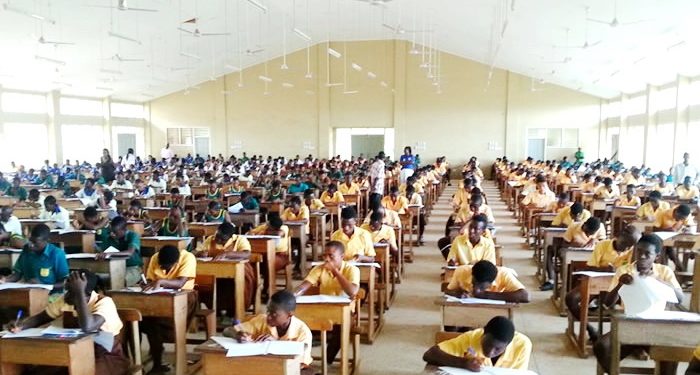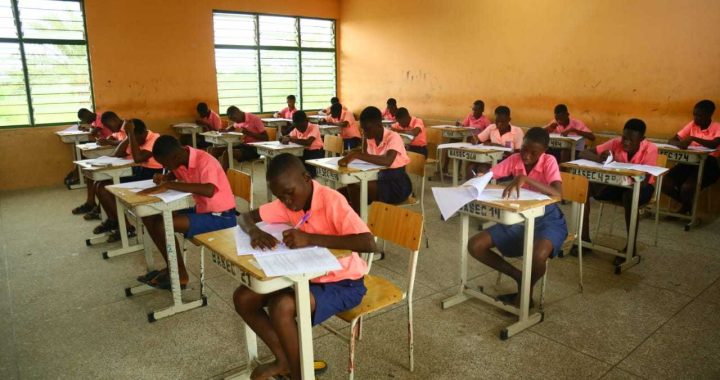Build your new 300 SHSs blocks at East Legon – Ablakwa fires NPP
Build your new 300 SHSs blocks at East Legon is the latest advise Hon. Ablakwa has given the NPP over their comments regarding the distance between Community Day Schools and main towns close to them.
Samuel Okudzeto Ablakwa minced no words when he directed the ruling New Patriotic Party and its leadership in government to build 300 new E-Blocks in East Legon.
He called on the Akufo Addo led administration to stop criticizing the location of Secondary schools built under the E-Block project and redeem their promises to the people of Ghana and build the 300 SHSs he promised the people of Ghana.
Hon. Samuel Okudzeto Ablakwa suggested they site such schools in prime locations such as East Legon.
His suggestion comes in the wake of the attempt by the ruling NPP government to rubbish the efforts of the NDC government E-Blocks. According to the NPP, the E-blocks built for Senior High School Education were sited at the wrong places and far from town hence the reluctance of the government to continue most of them.
The former Deputy Minister of Education under the erstwhile Mahama administration believes that the Community Day Schools have not been operated because the government led by Akufo Addo has failed to properly manage the schools.
He chastised the government for failing to do what is needed most. He said; It is only in our part of the world where the government can decide to make BECE graduates select schools they want to be enrolled in before the government tries to recruit the needed teaching and none teaching staff. This is the meaning I gathered from a post by Hon. Samuel Okudzeto Ablakwa’s
He quizzed by asking “Now, how about the Akufo-Addo led government starting work on their own manifesto promise of 300 new Senior High Schools and perfectly siting them in East Legon, Airport Residential Area, Cantonments and other choice locations only a superior competent NPP can secure?”
The most recent controversy about the siting of the E-Blocks former president Mahama build came when he visited one such abandoned edifice the Mpaha Community Day SHS one of the Community Day Schools which is located in Savannah Region specifically in the Central Gonja District.
The former president in an interview with journalists present at the site criticized the government for neglecting the school buildings.
He called on the government to act and stop the blame game that the schools were sited at the wrong places.
It will interest readers to know that many of the schools in major cities were ones far from the main communities however, the siting of such schools led to the new settlement, developing then it bridged the distance between the original towns and the school area. Siting schools a bit far from town but close to it can great new opportunities for the springing up of new communities, create job avenues for persons who settle in the new location and improve livelihoods.
However, there is no doubt that siting schools far from communities also have a telling effect on society. Governments must critically consider the reasons why it is prudent to locate schools far from the nearest community and help people appreciate it.
Many more Ghanaians have also argued that the NDC led government should have considered building the E-blocks within already existing schools that have huge land spaces. Names that have come up are many including PRESEC Legon and Achimota SHS just a few to mention.
These two schools can release land for not less than three E-Blocks each. Achimota SHS has what it takes to have five or more of the E-Blocks built there. Why the government did not consider that is still a mystery. If such schools across Ghana were considered for these E-Block projects, Ghanaians and the current government will have little to say or do and be forced to complete the projects in time.
What the current government should have also done after realizing that the schools were far from town was to complement the effort of the previous government by building dormitories for the schools that it felt were far from town. Such schools could still be called community boarding schools meant for school children within that community only.
Such a decision by the former government to site the new E-Blocks away from the town have both direct and indirect cost associated with it.
When schools like the E-Blocks are built far away from town, it indirectly adds to the cost of construction. In that, more financial commitments will have to be made to expand other social facilities (Utilities lie electricity, amenities like roads, and health facilities.
Others may argue that this helps expand the country and the locality within which the school is located as discussed earlier. However, parents are going to endure more transportation costs on a daily basis because the schools have been located far from the residence of students who may have to trek long distances or go by public transport on a daily basis.
If the government decided to foot the bills of transporting school children to school daily, the cost is shifted to the government and then finally to the citizenry through increased taxes.
The fact that the schools are far from the towns and villages also means that, students must very often leave home earlier than usual and get home later throughout their education because they are community day schools.
If the schools in question are located close to town, students may go to school on foot. According to the https://online.tarleton.edu best practices show that, in siting new schools, they must be at most a distance of half-a-mile, one-mile, or a maximum of two-miles of from town. This must also among other things consider the demographics and population density of the area.
Many of the E-Blocks in Ghana is more than 3 kilometers from the residence of many of the students placed in such schools.
Let us call a spade a spade. Some of the schools built under the E-Block are too far from town. Let us rather find ways by which as a country we can put away our political colours, face the truth and find solutions that will be to the advantage of our future leaders whom these schools were built for.
The government of the day can not demolish such schools because they are far, neither would it be prudent to leave them to rot. As a nation, we have invested so much into them and the capital injected into it must not go waste. Let us begin to think outside the box and come out with strategies that will help open these schools and make them accessible to basic school leavers rather than the political fights and mentality.

 Bimbilla: College of Education students leave campus as CETAG strike continues
Bimbilla: College of Education students leave campus as CETAG strike continues  Angie’s Leaked Tape: Angie Stylish Has Disgraced Konongo Odumase School – School Mate Angrily Speaks
Angie’s Leaked Tape: Angie Stylish Has Disgraced Konongo Odumase School – School Mate Angrily Speaks  1st STEM College of Education in Ghana: Bawumia cuts sod for construction
1st STEM College of Education in Ghana: Bawumia cuts sod for construction  Stop denying students exeat; NAGRAT to SHS Heads
Stop denying students exeat; NAGRAT to SHS Heads  BECE; Four Teachers caught up for assisting students- WAEC
BECE; Four Teachers caught up for assisting students- WAEC  North Tongu District BECE Candidates prevented from wearing shoes or belts
North Tongu District BECE Candidates prevented from wearing shoes or belts  Bawumia’s smartphone pledge misguided and visionless – Adongo
Bawumia’s smartphone pledge misguided and visionless – Adongo  Good Grow: The Marijuana Farm Founded by Akufo-Addo’s Daughters
Good Grow: The Marijuana Farm Founded by Akufo-Addo’s Daughters  National Food Suppliers for Free SHS set to picket at Education Ministry
National Food Suppliers for Free SHS set to picket at Education Ministry  Information Ministry justifies ¢151k paid to staff as Covid-19 risk allowance
Information Ministry justifies ¢151k paid to staff as Covid-19 risk allowance